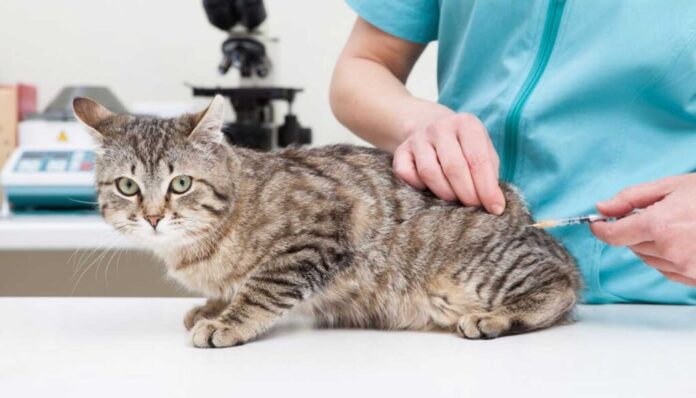Last Updated on August 16, 2023 by Fumipets
Why Rabies Vaccine for Cats Is Important
The rabies vaccine for cats holds crucial significance in safeguarding feline health and public safety. Rabies, a deadly viral disease transmissible to all mammals, including humans, is spread through the bite of infected animals.
By vaccinating cats against rabies, their well-being is protected, preventing them from contracting the fatal disease. Moreover, the vaccine contributes to preventing rabies transmission to humans and other animals.
Legal mandates in many areas underscore the importance of this vaccine, ensuring compliance aids in disease control. Even indoor cats can be exposed to rabid animals or escape, making the vaccine a vital preventive measure. By vaccinating cats, potential disease spread through contact with other animals or humans is thwarted.
Vaccine for Cats
In the United States, rabies is detected in more than 250 cats per year. When compared to the millions of cats that exist worldwide, this number may seem modest, yet it is still important. This is due to rabies being the world’s most lethal infectious illness.
There is no cure for infection once the symptoms start. The rabies virus may also be transmitted from animals to humans since it is a zoonotic disease. And it can be just as fatal to people as it is to cats.
Although there is no known treatment for cat rabies, there is a widely accessible and very effective tool you may use to safeguard your cherished pet: the rabies vaccine for cats.
How Is Rabies Transmitted?
The viral illness rabies attacks the brain and spinal cord of animals’ central nervous systems, resulting in fatal inflammation. The majority of pet rabies cases, according to the Centers for Disease Control and Prevention (CDC), are caused by contact with wild animals such as raccoons, bats, skunks, and foxes.
The rabies virus may be found in the saliva of infected animals, and transmission usually happens when one of these animals bites a cat. Even while it happens seldom, the virus may also spread when infected saliva comes into contact with a cut, an open sore, or a mucous membrane (such as the eyes, nose, or mouth). Contact with an infected animal’s blood, urine, or excrement is not harmful, according to the CDC.
The rabies virus enters a cat’s body and proceeds to the brain through the nerves. According to Brandi Whittemore, DVM, of Hancock Veterinary Services in Pineville, Missouri, this procedure—known as the incubation period—usually lasts between two weeks and around five months, but it may be longer or shorter.
Cats don’t exhibit any clinical symptoms while the condition is incubating. These often start after the virus enters the brain and starts to spread. Additionally, at this stage, the virus enters the salivary glands and creates infectious saliva.
Why the Rabies Vaccine is Important for Cats
Although rabies cannot be treated, it may be avoided. Additionally, rabies prevention for cats involves more than simply animal health. There are significant concerns for human health as well since the illness may spread from cats to humans. Whittemore believes the rabies vaccine to be the most crucial immunization a cat may get because of this.
Nearly 60,000 individuals are killed by the rabies virus each year, and most of them are youngsters. According to Whittemore, the popularity of pets with vaccinations is the sole reason the illness is so uncommon in the US. By giving your cat the rabies vaccine, you can help the world’s effort to eliminate all rabies-related fatalities.
Another participant in this endeavor is Luke Gamble, BVetMed. As the founder and CEO of the NGO Mission Rabies, which administers vaccination and awareness campaigns in rabies hotspots like India and Malawi, he has direct experience with the pain that rabies can bring about and believes that the vaccine is the safest and most effective approach to protect both humans and animals.
According to Gamble, by keeping your dogs’ rabies vaccinations current, you may help prevent them from contracting the illness from wildlife or other unvaccinated pets and, in turn, avoid any potential transmission to your family or other individuals. “We must all take action to prevent disease outbreaks, even in the United States where human rabies cases are uncommon.”
It’s also crucial to remember that the CDC advises quick euthanasia if your cat has never had a vaccination and is thought to have come into contact with rabies. The cat may only be kept in rigorous confinement for four months without direct contact with people or other animals, although it is improbable that the cat would recover from this.

Rabies Vaccine Schedule for Cats
According to Whittemore, most states have laws requiring you to vaccinate your kitten between the ages of 12 and 16 weeks with a booster dose a year later due to the seriousness of the rabies danger to both humans and animals. By speaking with your local health agency or consulting your veterinarian, you may find out what is necessary in your community.
Local regulations may also determine how often your cat receives additional booster vaccinations. A one-year shot and a three-year shot are the two choices. Whittemore claims that since the components are the same in both vaccinations, the only difference between them is in the labeling.
Even if your cat is current on vaccinations, your veterinarian may give your pet an additional shot just to be safe if it comes into touch with a possibly rabid animal. The rabies vaccination also does a fantastic job of preventing rabies infections in cats, despite the fact that no vaccine is 100% effective.
How Much Does the Rabies Vaccine for Cats Cost?
Depending on the product and the veterinarian’s practice, rabies vaccination for cats might cost anywhere from $15 and $35. If money is an issue, you may be able to locate a local animal shelter or low-cost vaccination facility that would provide the vaccine for nothing or at a significantly discounted cost.
Do Indoor Cats Need a Rabies Vaccine?
Yes, according to Whittemore, indoor cats should also get a rabies vaccination. One is that it’s likely already required by the state where you reside. But more crucially, even though an indoor cat has a small probability of contracting the rabies virus, that likelihood isn’t zero.
Your cat could go out the front door, or a member of the neighborhood animals, like a bat or raccoon, might get in via an unlocked window or door. Rabies is characterized by the ability to make timid and reserved animals lose all fear of other animals and becoming very violent. It isn’t worth the risk given how terrible the sickness is.
Side Effects of the Rabies Vaccine on Cats
Although the rabies vaccination is relatively safe, it may have adverse effects including a moderate fever, a reduction in appetite, and lethargy, like other vaccines that trigger an immunological response, according to Whittemore.
Additionally, your cat might have pain or edema where the injection was given. According to Whittemore, these adverse effects usually go away within one or two days.
It’s also possible, however unlikely, that your cat may have an adverse response to the rabies vaccination. Hives, vomiting, trouble breathing, and facial edema are some of the adverse symptoms that are connected. Consult a doctor right away if you believe your cat is experiencing an allergic reaction.
Another unusual response that may happen after any injection in cats, according to Whittemore, is feline injection-site sarcomas. These are malignant tumors that may develop months or even years after the injection at the location of the injection. Be careful to inform your veterinarian if a lump appears where your cat had an injection.
And don’t be afraid to ask your veterinarian’s staff for guidance if you ever have concerns or doubts about how your cat will respond to a vaccination.
Questions & Answers:
At what age should I get my cat vaccinated against rabies?
Kittens are typically vaccinated around 12 to 16 weeks old, followed by a booster shot within a year. Adult cats receive boosters every 1 to 3 years, per veterinarian guidance.
Is the rabies vaccine safe for my cat?
Yes, the rabies vaccine is generally safe. Mild side effects like temporary lethargy or injection site discomfort are rare.
Can indoor cats skip the rabies vaccine?
While indoor cats face lower risks, they can encounter rabid animals or escape. Vaccinating indoor cats provides a safety net against unexpected situations.
Are there legal consequences for not vaccinating my cat against rabies?
Not vaccinating can lead to legal penalties in many regions. In case of a cat bite, an unvaccinated cat might need quarantine or even euthanasia for rabies testing.
How often does my cat need a rabies booster shot?
The frequency of booster shots depends on local regulations and veterinarian recommendations. Generally, adult cats receive rabies boosters every 1 to 3 years.
Vaccinating cats against rabies is a responsible choice, ensuring their health and the safety of both human and animal populations. Discuss with your veterinarian to establish an appropriate vaccination schedule aligned with local regulations and your cat’s specific needs.
https://www.youtube.com/watch?v=zDxY8NMo67U


















